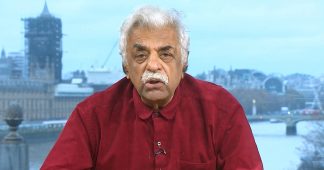By Dimitris Konstantakopoulos
Dec. 5, 2019
The British elections scheduled to take place on December 12th constitute a milestone for the evolution of the European and global situation. They are the most important elections in Europe after those in Greece in 2015, which brought a radical, anti-systemic force to the EU and NATO– or, at least, a force pretending to be such, and voted in because it was understood as such.
Ιn the British election the forces of a quasi-far-right quasi-“radicalism” oppose the left-wing “radicalism”, something that is far from the usual clash between right-wing conservative and social-democratic parties. This fact by itself is absolutely revealing of the depth of the crisis western capitalism (and the European Union) is facing in the wake of 2008, with no easy exit in sight. Both the establishment and the popular classes can no longer serve their interests and seek solutions to their problems by the usual political tools they were using after WWII. In Britain they did not create new ones, as happened in Greece and to a large extent in France, they transformed the old ones.
As this article is written, polls seem to indicate a large victory for Boris Johnson’s Tories, but also demonstrate a rise of Corbyn’s Labour Party, thus making any prediction risky. Given that there is not much time remaining, we cannot rule out the electoral results imposing an unstable balance between these two forces and thus moderating somehow, but only temporarily, both right-wing and left-wing radicalism in British society and politics.
However, whatever the outcome, it must be assumed for certain that Britain, like France, is now entering a period of very important political and social conflicts that will have a major impact on the European and global situation.
Even in its decline, Britain remains a great power, it possesses nuclear weapons, it is a permanent member of the Security Council and it has some international influence of its own through the Commonwealth and its “special relationship” with the US. It has lost its empire, but it has the imperial know-how and an almost atavistic tendency to use it at every opportunity, as demonstrated, among other things, by London’s enthusiastic involvement in the destruction of Iraq and Libya. The “imperial syndrome” is deeply entrenched into the British “state DNA” and it is useful to remember it was Churchill, not Truman, who started the Cold War with his Fulton speech in 1946. Of course, Britain has, at the same time, a great socialist tradition, being the motherland of modern workers movement.
Johnson’s victory will bring with it the danger of a new, big war in the Middle East that could turn into nuclear. Under Johnson, Britain will keep supporting the very dangerous and destabilizing attempt to encircle Russia by NATO and its nuclear weapons, it will probably favor escalating tensions with China and it will support Washington in its policy of imposing new right-wing authoritarian regimes in Latin America. Johnson’s victory will be a serious blow to efforts to save humanity from the fast-moving and highly threatening climate change, a problem of life or death for humanity today, not in ten years.
Johnson’s victory will also reinforce the forces of international financial capital and neoliberalism which are seeking an exit from the crisis by a) intensification of austerity policies, leading to a kind of “social genocide” of the poorest classes in western societies, accompanied by serious limitations of what remains of social and democratic rights in the West, b) by intensifying the war of the multinationals against nature (the “physical and biological capital” of humanity) c) by continuing and launching new wars against the “external enemies” of western capitalism (Islam, Russia, China, the Third World), making thus more difficult the already very difficult task of achieving a peaceful, social, democratic and ecological exit out of the post-2008 economic crisis. This crisis, which began in 2008, is deep in the history of capitalism, along with the 1870-80 and the 1929 crises. Such deep crises were directly responsible for the emergence of modern Imperialism on a massive scale, and for both world wars, the Russian and the Chinese revolutions, Nazism and huge reform projects like the New Deal in the US.
Read more at https://uwidata.com/6582-the-geopolitics-of-the-british-election/











